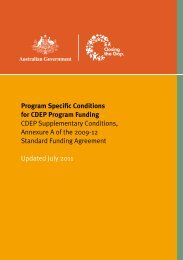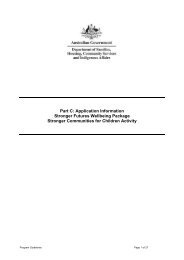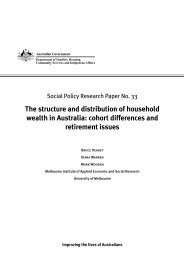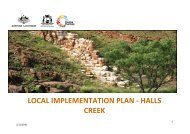What's the Answer? - Create
What's the Answer? - Create
What's the Answer? - Create
Create successful ePaper yourself
Turn your PDF publications into a flip-book with our unique Google optimized e-Paper software.
PREPARATION PHASEISSUESYOUNG PEOPLE’S SOLUTIONSPlanning• Young people transitioning from carereport that <strong>the</strong>y do not have leavingcare/transition plans; 65% have no plan for<strong>the</strong>ir future.• Young people are often not involved in <strong>the</strong>transition planning process.• Young people are often not informed about<strong>the</strong>ir transition.“It was terrible. I was told a week before Iturned 18 that I was leaving care.”• Develop a national transition from care planning process inconsultation with young people including: a Template for a Leaving Care Plan a Checklist of actions to be completed beforetransitioning an Exit Care Interview with <strong>the</strong> young person six monthsbefore transitioning.• Employ specialised transition-from-care workers in eachregion.• Develop a Participation Strategy to engage children andyoung people in planning.• Adopt a consistent approach to transition planning andcommence <strong>the</strong> process at 15 years of age.Housing• Young peoples’ capacity and willingness tolive independently is not explored fully in<strong>the</strong> planning process. Young people in <strong>the</strong>general population now live at home forlonger (over 25 years of age).• Housing/accommodation options are notexplored early enough in <strong>the</strong> planningprocess resulting in limited housing optionsat <strong>the</strong> point of transition.• Financially compensate carers to continue to providesupport for young people up to age 21 to stay with existingcarers if this is <strong>the</strong> young person’s preference.• Develop formal partnerships to determine a suite ofhousing/accommodation options available for youngpeople with a care experience.Education• Teachers are not trained to understand <strong>the</strong>impact that abuse and neglect have onyoung people with a care experience.• Young people in care have a higher rate ofsuspension or expulsion from school than<strong>the</strong> general population.• Education support plans are often notdeveloped, and when <strong>the</strong>y are <strong>the</strong>y maynot be effective.• Young people’s academic results are lowerthan those of young people in <strong>the</strong> generalpopulation.• Lack of clarity regarding roles andresponsibilities within CP Departments andEducation Departments means youngpeople fall through <strong>the</strong> cracks.• Child Protection orders finishing whilst ayoung person is completing his/her seniorcertificate, or turning 18 during <strong>the</strong>semester, and <strong>the</strong> young person’s schoolingis interrupted if <strong>the</strong>y have to leave <strong>the</strong>ircare placement. Many young people areunable to finish <strong>the</strong>ir schooling as <strong>the</strong>y have• Review training for teachers focussing on understandingand managing <strong>the</strong> impact of abuse (on behaviour) foryoung people in care in educational settings.• Review Educational Support Plans to ensure <strong>the</strong>y areeffective and implemented for all young people in care.• Develop educational tutor programs for young people witha care experience as an essential part of <strong>the</strong>ir educationalsupport plan, not an adjunct to it, reducing lengthy delaysin obtaining necessary permissions.• Extend placements for all young people turning 18 during<strong>the</strong>ir final year of school until <strong>the</strong>ir formal high schooleducation is completed.14




![pdf [107kB] - Department of Families, Housing, Community Services](https://img.yumpu.com/51272499/1/190x245/pdf-107kb-department-of-families-housing-community-services.jpg?quality=85)










![Land Claim - pdf [278kB] - Department of Families, Housing ...](https://img.yumpu.com/47002639/1/184x260/land-claim-pdf-278kb-department-of-families-housing-.jpg?quality=85)

![Borroloola Land Claim - pdf [299kB] - Department of Families ...](https://img.yumpu.com/46103973/1/184x260/borroloola-land-claim-pdf-299kb-department-of-families-.jpg?quality=85)